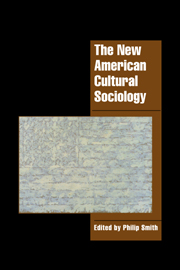Book contents
- Frontmatter
- Contents
- Notes on contributors
- Preface
- The new American cultural sociology: an introduction
- PART I Culture as text and code
- PART II The production and reception of culture
- 6 The reception of Derrida's work in France and America
- 7 Censorship, audiences, and the Victorian nude
- 8 The Devil, social change, and Jacobean theatre
- 9 Victorian women writers and the prestige of the novel
- 10 The ambiguous and contested meanings of the Vietnam Veterans Memorial
- PART III Culture in action
- Index
- Title in this Series
10 - The ambiguous and contested meanings of the Vietnam Veterans Memorial
Published online by Cambridge University Press: 18 January 2010
- Frontmatter
- Contents
- Notes on contributors
- Preface
- The new American cultural sociology: an introduction
- PART I Culture as text and code
- PART II The production and reception of culture
- 6 The reception of Derrida's work in France and America
- 7 Censorship, audiences, and the Victorian nude
- 8 The Devil, social change, and Jacobean theatre
- 9 Victorian women writers and the prestige of the novel
- 10 The ambiguous and contested meanings of the Vietnam Veterans Memorial
- PART III Culture in action
- Index
- Title in this Series
Summary
In this chapter, we address two problems, one general and one particular, and claim that they are best approached by referring each to the other. The first, general, problem is that of discovering the processes by which culture and cultural meaning are produced. Collective memory, moral and political entrepreneurship, dominant ideologies, and representational genres are all refracted through these processes and must all be sociologically identified and gauged. The second, particular, problem is the Vietnam Veterans Memorial. This unusual monument grew out of a delayed realization that some public symbol was needed to recognize the men and women who died in the Vietnam War. But its makers faced a task for which American history furnished no precedent – the task of commemorating a divisive defeat.
Dedication
On November 11, 1982, seven years after the last American died in Vietnam, the Vietnam Veterans Memorial was dedicated. Immediately before the dedication ceremony, 150,000 spectators watched and applauded as 15,000 veterans passed before them. Elaborate floats and flyovers by fighter planes and helicopters embellished the three-hour parade. The more solemn aspects of this colorful Veterans Day had been established by the reading out of the names of all 57,939 Americans killed in Vietnam in an earlier fifty-six-hour candlelight vigil at the National Cathedral. The President of the United States participated in the observance, lighting a candle for the dead and listening to part of the long roster of names.
From the very beginning of these commemorative rites, the themes of recovery and solidarity were repeated.
- Type
- Chapter
- Information
- The New American Cultural Sociology , pp. 151 - 166Publisher: Cambridge University PressPrint publication year: 1998

